Germany’s Iranian-Born Deputy Secret Service Chief Traveled To Iran

An Iranian-born senior official of the German domestic intelligence agency has recently made a personal visit to Iran following the death of her father.

An Iranian-born senior official of the German domestic intelligence agency has recently made a personal visit to Iran following the death of her father.
German-language news magazine Focus reported on Friday that Felor Badenberg, the vice president of the Federal Office for the Protection of the Constitution (BfV) violated the strict security precautions of her own agency by making the private trip to the Islamic Republic, as many European countries as well as the United States are struggling to secure the release of their citizens held in Iran.
Badenberg, who was only promoted to the top of federal intelligence agency on June 22 by Interior Minister Nancy Faeser, flew to the Iranian capital months ago to settle inheritance matters after the death of her father. She had been previously the head of the Right-Wing Extremism and Terrorism Department of the BfV since June 2020.
All BfV employees are strictly prohibited from traveling to or staying in countries such as Iran, Syria or Russia as they are at risk of arbitrary detention, mainly over espionage. The BfV president and the minister were apparently aware of her trip but they declined to answer if they approved Badenberg's flight to Tehran.
Security circles assume that the 46-year-old was under meticulous surveillance by the Iranian secret service after she landed in Iran, with a senior government official saying that Iranian counterintelligence has certainly recorded very precisely who she met and where, meaning that Badenberg's contacts and family in Tehran are now in peril. The risk of possible blackmail is too high, the report suggested.
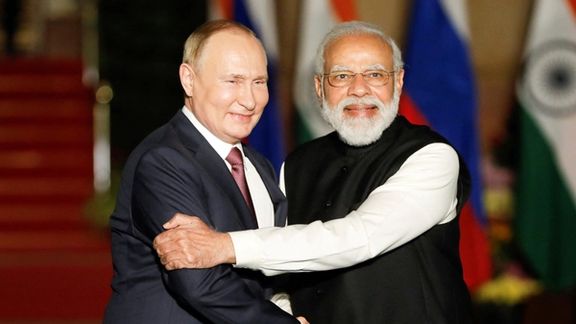
China’s growing imports of Iranian oil is one reason why India has not followed Western sanctions on Russian crude, more than tripling imports in recent months.
An analysis published by Reuters on Friday quotes Indian officials who said, “New Delhi wants to avoid repeating what it sees as the mistakes of the past: abiding by sanctions on Iran and winding down oil imports, only to see its main regional rival China continue unpunished and benefit economically.”
The result has been a huge leap in volumes from Russia. In May, India imported 819,000 barrels per day (bpd), from 277,000 bpd in April and 33,000 bpd a year ago. Russia is now the second biggest supplier to India, replacing Saudi Arabia, while Iraq continues to be the largest.
India abided by US sanctions when former US president Donald Trump withdrew from the 2015 nuclear agreement known as JCPOA and gradually imposed full oil export sanctions on Iran. But China continued buying small volumes until November 2020 when it began noticeably increasing imports of illicit Iranian shipments.
China has kept up larger Iranian oil imports and is now buying massive amounts of Russian oil at discount prices. According to various estimates Tehran is exporting around 750,000 barrels per day and China is by far the largest buyer.
The Biden Administration, which decided early on to start talks with Tehran to revive the JCPOA, has failed to put effective pressure on China to stop imports of Iranian crude, which also come with a discount.
This has convinced India not to join Western sanctions against Russia, seeing itself shortchanged by abiding with US sanctions on Iran, while its rival is getting cheap oil.
"India has the attitude that if China is buying, why wouldn't we?" Robin Mills, chief executive of energy consultancy Qamar Energy told Reuters.
"India doesn't want to be in the same position again when China continued to buy Iranian oil and India stopped it."
Last month, Indian Foreign Minister Subrahmanyam Jaishankar posed the question at a conference: "Why are Indian money and funds coming from India seen as funding the war (in Ukraine), when Europe also buys gas from Russia?"
Referring to US sanctions on Iranian and Venezuelan crude, he said: "They (Europe and the US) have squeezed every other source of oil we have and then say you will not go to the market and get the best deal for the people; it's not a fair approach".
That all means New Delhi is reluctant to put US interests ahead of those of Russia, especially after it felt it was harmed economically by sanctions on oil from Iran and Venezuela.
Under Modi's nationalist government, India has pursued an assertive foreign policy, standing up to China in a two-year military border standoff and rejecting Western criticism of domestic policies some say are authoritarian and divisive.
Indian officials counter that what refiners are doing is legal and some European countries are still buying Russian oil and gas. Executives at state-owned and private refineries do not expect purchases of Russian crude to slow any time soon, the report said.
The United States has offered to sell more defense equipment and oil to India, for example, and New Delhi joined a U.S.-led trade partnership Indo-Pacific Economic Framework for Prosperity.
India is a member of the Quad alliance, which links it with the United States, Japan and Australia. India also signed a free trade agreement with Australia, talks for which initially began in 2011.
With reporting by Reuters
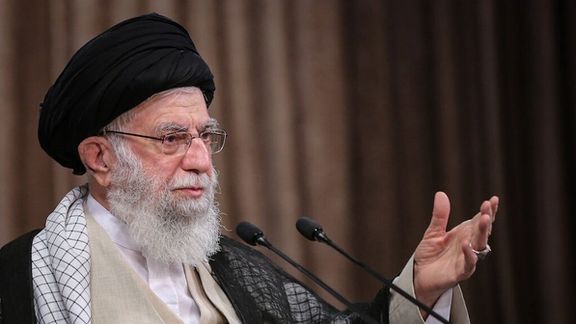
In a message to world's Muslims, Ali Khamenei the ruler of the Islamic Republic of Iran has called for "unity and spirituality" while attacking Western values.
Khamenei’s Shiite followers call him the leader of the Muslim world, but his appeal reaches a tiny minority of Muslims who are overwhelmingly Sunni. He is known among many Sunnis as a man who has been sowing division among Muslims through his actions in Syria, Iraq, Yemen and elsewhere.
Meanwhile, his critics say that the extent of despotism and financial corruption in the system under his leadership leaves no room for spirituality.
Khamenei also repeated his favorite theory that the West tithers on the verge of defeat and collapse, at a time when the United States and Europe have shown strong unity to confront Russian aggression in Ukraine and NATO has just accepted Sweden and Finland as new members.
He said in his message on the occasion of the annual Hajj pilgrimage: "The Islamic nation can once again observe its unity and harmony in this clear, timeless mirror, and take this opportunity to turn away from factors that lead to disunity and division." The statement is in total contradiction to Khamenei’s and his government's behavior as they have not been able to maintain friendly ties with Muslim nations around Iran, including Saudi Arabia where millions of Muslims from other countries gather for the pilgrimage.
Nonetheless, Khamenei accused "the enemies of Muslim nations" of "weakening the two bolstering elixirs of Islamic unity and spirituality among our nations."
"The enemies of Islam strive to weaken spirituality by promoting a western lifestyle that is devoid of spirituality and which is rooted in a short-sighted, materialistic vision of the world," Khamenei reiterated. "on the other hand," he stressed "everyone must work to overcome the factors that foster division and disunity."
Khamenei in his message emphasized the role of ideas such as "Islamic awakening, resistance," and what he called "the political governance in the Islamic Republic of Iran," as the elements of unity in the Muslim world. This comes while his idea of resistance has so far been nothing more than reckless anti-Americanism and opposition to the coexistence of regional nations with Israel.
He further charged that " the Arrogant Powers, and the United States are worried about such a trend in the Islamic world and employ all their resources in order to confront it. The tactics they employ range from dominating the media and soft warfare, to warmongering and starting proxy wars, political espionage, and acts of inducement, and threatening, bribing and other forms of enticement." He added that "the United States is using Israel as a tool for this all-out effort." Khamenei simply ignored Israel's alliance with most of the region's Muslim nations to prevent the Islamic Republic's atrocities.
Meanwhile, on the same day that Khamenei's message was sent out, his senior adviser for international affairs, Former Foreign Minister Ali Akbar Velayati whose Cold War era ideas is believed to have some influence on Khamenei, said "Iran cannot tolerate NATO's presence at its borders," mindless of the fact, that Turkey, a NATO member state for more than 70 years is a neighbor of Iran.
Velayati also echoed Khamenei's belief that the United States and Europe have been in decline during recent years, without providing any proof for the claim.
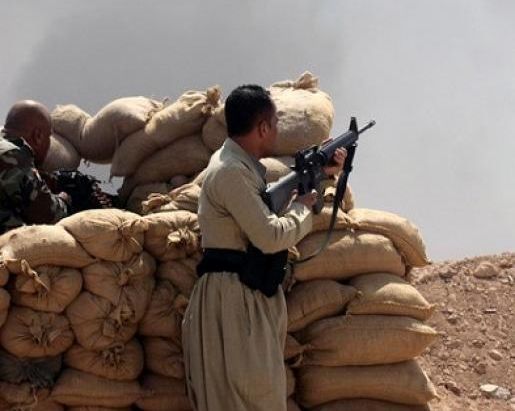
A Kurdish rights group says at least four servicemen of Iran’s Revolutionary Guard have been killed in armed clashes with one of the Kurdish parties in northwestern Iran.
According to Hengaw on Friday, the skirmish took place between IRGC forces and fighters of the Kurdistan Workers' Party in areas between Senji and Mateh-Kharpeh villages near the town of Salmas in West Azarbaijan Province Thursday evening.
The report said at least another four IRGC members were injured in the clashes and taken to Hospital in Salmas but there is no mention of possible casualties on the Kurdish side.
No media close to the Revolutionary Guard or the Kurdistan Workers' Party has published any news about the incident. Iran International cannot independently confirm the report.
The Islamic Republic calls the Kurdish armed groups in the western provinces of Iran, "terrorist groups" or "anti-revolutionary" but these groups say that the goal of their armed campaign is "defending the rights of the Kurds".
Generally, the Kurdish parties − including Komala and the Kurdistan Democratic Party of Iran (KDPI) − favor Kurdish autonomy within a federal Iran. Pejak (the Free Life Party of Kurdistan), an affiliate of the Kurdistan Workers Party (PKK), formed in Turkey but also based in northern Iraq, has generally favored a unified, independent Kurdistan uniting Kurds in Syria, Iraq, Turkey, and Iran.
In June, a senior member of the Organization of the Iranian Kurdistan Struggle accused the Islamic Republic of being behind an assassination attempt on fellow fighter Akbar Sanjabi in Erbil, the capital of the Kurdistan Region in Iraq.
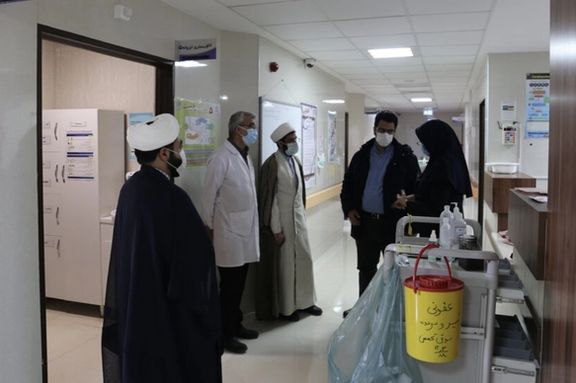
The so-called morality police have started patrolling medical and academic centers in Iran’s northeastern city of Mashhad to enforce compliance with the Islamic dress code (hijab).
In a statement on Thursday, Mashhad University of Medical Sciences confirmed the presence of hijab police and teams from what the Islamic Republic calls the ‘Enjoining right and forbidding vice headquarters’ in hospitals to inspect the dress codes of the personnel and interns in medical centers.
Social media users earlier reported the presence of such teams in various wards of hospitals and medical centers, with some reports of pressures on hospitals to separate male and female patients admitted to the ICU.
Esmail Rahmani, deputy public prosecutor of the religious city of Mashhad has recently ordered the municipality to prevent ‘bad-hijab’ women from using public transportation including the metro and threatened to take legal action against such officials for failing to do so. He has also ordered the governor to ban services in banks and government offices to ‘bad-hijab’ women.
Iran’s hardliner president has recently ordered all government entities to strictly implement a “chastity and hijab” law after weeks of stricter measures on the streets.
Harsher than usual enforcement of hijab this summer has raised protests from many in Iran including some moderate religious and political figures.
No one knows if the enforcement of strict religious rules is related to the authorities attempt to show force, but some citizens see the effort as a scheme to pit people against one another.
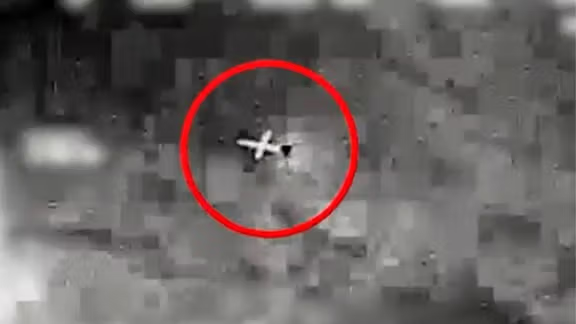
Israeli Defense Minister Benny Gantz has confirmed that the drones Hezbollah launched toward the Karish gas rig last week were Iranian unmanned aerial vehicles (UAVs).
In a briefing to military reporters on Thursday, Gantz said “that Hezbollah carries out missions for Iran, and its weapons are weapons made in Iran whether it is manufactured there or the knowledge acquired by them.”
“The State of Israel knows how to protect its assets well, and Hezbollah must understand that the mission it is carrying out on behalf of Iran could become a deadly mission that will first and foremost harm the interests of Lebanese citizens,” he added
On Saturday Israel intercepted three Hezbollah drones launched toward one its Mediterranean gas rig Karish. After Saturday’s incident, parts of the drones were retrieved and taken for examination.
Hezbollah confirmed it launched the drones after its chief Hassan Nasrallah threatened Israel after a new drilling platform arrived at the gas field a month ago.
The gas field near Lebanon's coast -- which sits in a maritime area claimed by both Lebanon and Israel -- will produce gas not only for Israel, but eventually also for the European Union, tapping into EU countries' quest to replace Russia as an energy supplier since it invaded Ukraine.
He also vowed to increase funding and accelerate development of a laser air defense system, set to be showcased for US President Joe Biden during his trip next week. Israel reportedly intends to ask Biden to approve the delivery of the system to Arab countries aligned against Iran, including Saudi Arabia.